Previous: The Mobile Game | Next: Conclusion | Back to Start
A Review of Umamusume: Pretty Derby
Part 4: The Anime
Movie: Beginning of a New Era
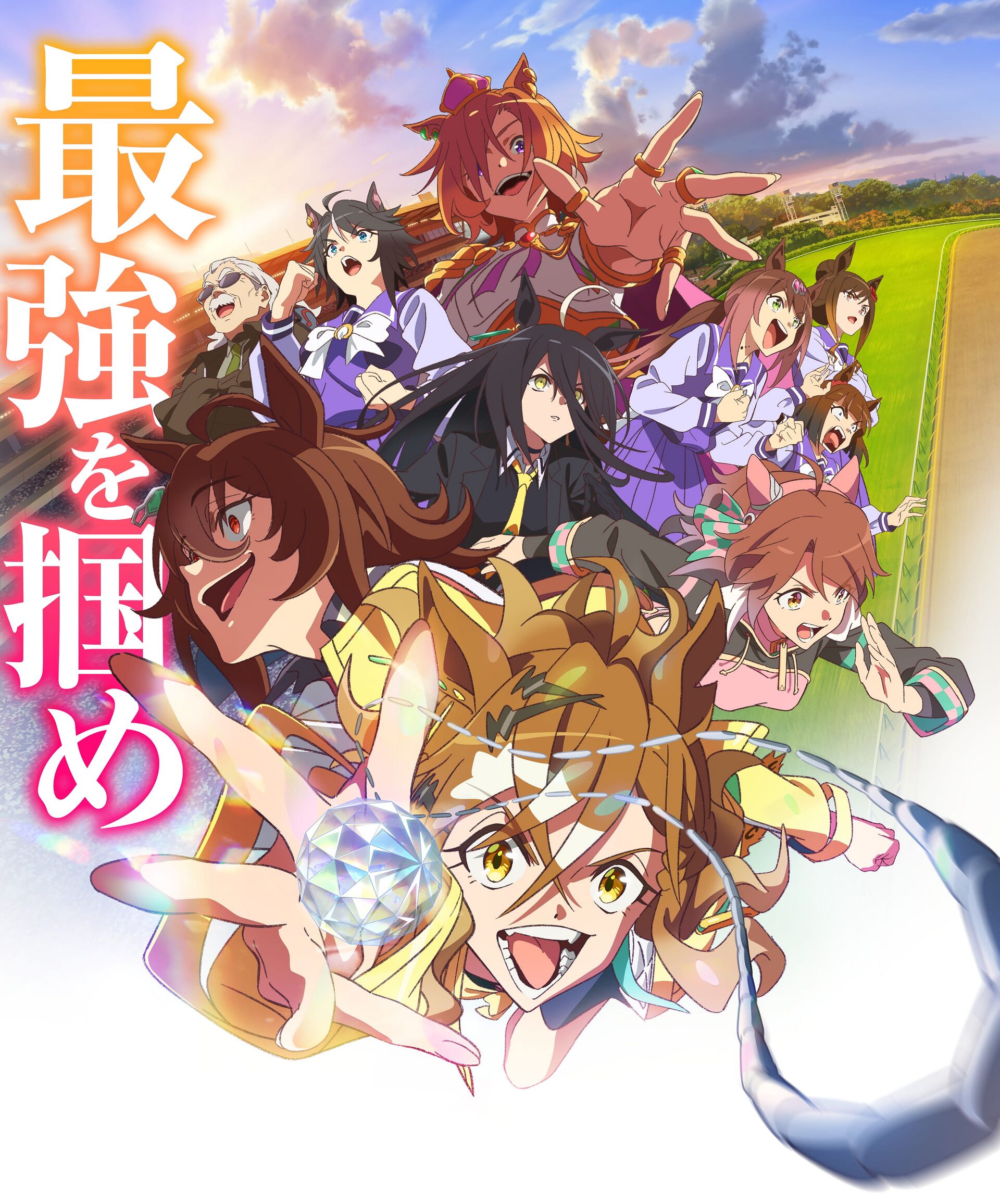
This movie. This is the single bit of Umamusume that I recommend as a starting point for anyone wanting to dip their toes into the water of this buckwild franchise. The animation and art direction are fantastic, capturing both the intensity of racing and essential traits of each character. You really get a sense of who they're supposed to be, and how they feel about each other. Go watch this movie and come back to read the rest. If you want to get a sense for why people are obsessive about these horse girls, this is the most succinct and well-produced way to see it in action.
I am mentioning it first, despite it coming out later, because it's the most approachable bit of Umamusume media to start with. Don't start with season 1. Start here instead. If you have any intention of engaging with this franchise at large, put this review down now, go watch it, and come back.
If you need more convincing, here's this ridiculous Death Grips AMV someone made using footage from the movie. It goes harder than it has any right to, partially because of the movie's slick animation, and partially due to the video creator's knack for timing. This kind of nonsense is par for the course for Umamusume fans, but Death Grips?

This series centers around the protagonist, Jungle Pocket (nicknamed Pokke) and her rivalries with the most powerful umas of her generation. She arrives to the scene in the midst of all-time performances by two prominent characters, TM Opera O, and Agnes Tachyon.
Opera is a key character in a series of two prior movies/OVAs, Umamusume: Road to the Top and she currently stands at the very top of the racing circuit, receiving the nicknamed the "Supreme Rule of the Century's End," she's a haughty, arrogant final boss for Pokke to try and surpass.
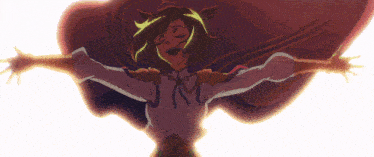
Before facing Opera, however, she gets humbled in an early race against Tachyon, whose strength and speed leads her to win by a wide margin. Pokke, shaken by the effortlessness by which she was beaten, commits to training and confronts Tachyon. When she seeks her out, she finds Tachyon in a laboratory, pouring over her research. Pokke challenges her, and she responds by laughing in Pokke's face, declaring that "one can never have too many guinea pigs in an experiment," and accepts her challenge.

When they meet to race again, Pokke challenges Tachyon up through the final stretch, before Tachyon taps into her full strength, once again blasting off and leaving Pokke in the dust. At the end of race, however, it becomes clear that she overdid it, with a latent leg injury flaring up. This is depicted dramatically during the race, showing her ankle metaphorically shattering like glass.
Turns out, Tachyon is a glass cannon. She is remarkably fast and powerful, but she's also incredibly frail. She struggles with something akin to chronic pain, alongside weakness in her legs that leaves her feeling like a ticking time bomb. At any time, she could be severely injured, ending her racing career forever. This is what's driving her to single-mindedly pursue her research, looking for a way to overcome this hidden disability and unlock her full potential. This race spooks her, revealing how near she is to her disability overtaking her.
Tachyon hides this injury from the public, but decides to pull out from her and Pokke's next race, announcing that she's on an indefinite hiatus from racing. She decides that the greatest rivals of her generation will be the subjects she watches from a distance, attempting to understand the limits of the Uma physique through her peers. She doesn't share any of this to any of them though, playing her cards close to her chest and remaining emotionally distant.

Pokke shows up at Tachyon's lab shortly after that announcement, angry and distraught that her rival just took away any opportunity that she'll have to beat her. She then falls into dispair, feeling that, if she's unable to beat Tachyon, there's no chance that she will be able to take anyone else on. At one point, this gets depicted as a mental image, where she is attempting to sprint, but a spectre of herself stands in front of her, gripping the top of her head, holding her back from moving forward. She is losing her mental battle with herself.
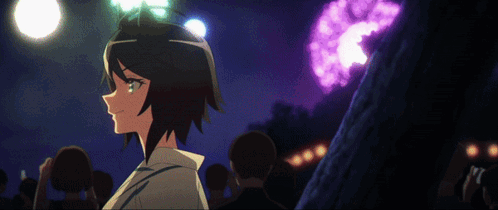
Fuji Kiseki, her mentor and friend, steps in to guide her through this mental block. Fuji suffered an injury that she could never overcome, ending her career early. Her trainer, distraught that he couldn't help her overcome her injury, also retired from the circuit, returning to train Pokke because he saw something of Fuji in her. Fuji, seeing Pokke suffering through the same mental anguish she went through herself, steps in and challenges Pokke to an exhibition race, her first time racing in years. In so doing, Fuji believes that Pokke will rediscover her passion and drive, and overcome whatever is holding her back.
The movie reaches a climax as Pokke, Opera, and her friend Dantsu Flame entering a big race, with Tachyon watching in the stands. All three show their finest capabilities, challenging each other to the very end. As they push each other through the final stretch, Tachyon finally accepts the emotions that she's been intellectualizing away, moved by seeing them giving their all. She leaps out of her seat and takes off racing through the concourse, then out of the stadium and into the streets. She declares that she cannot just sit idly by and let her peers push past their limits, and will do all she can to get back onto the track.
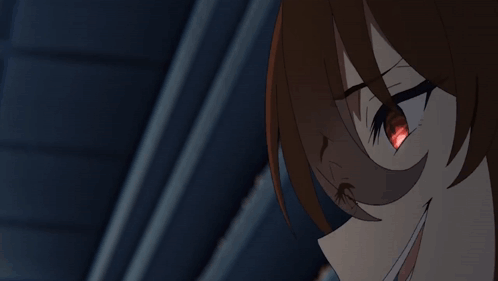
Just before the credits, you see Pokke, Opera, Dantsu and Tachyon all on their way through the tunnels before the next race, all ready to take each other on.
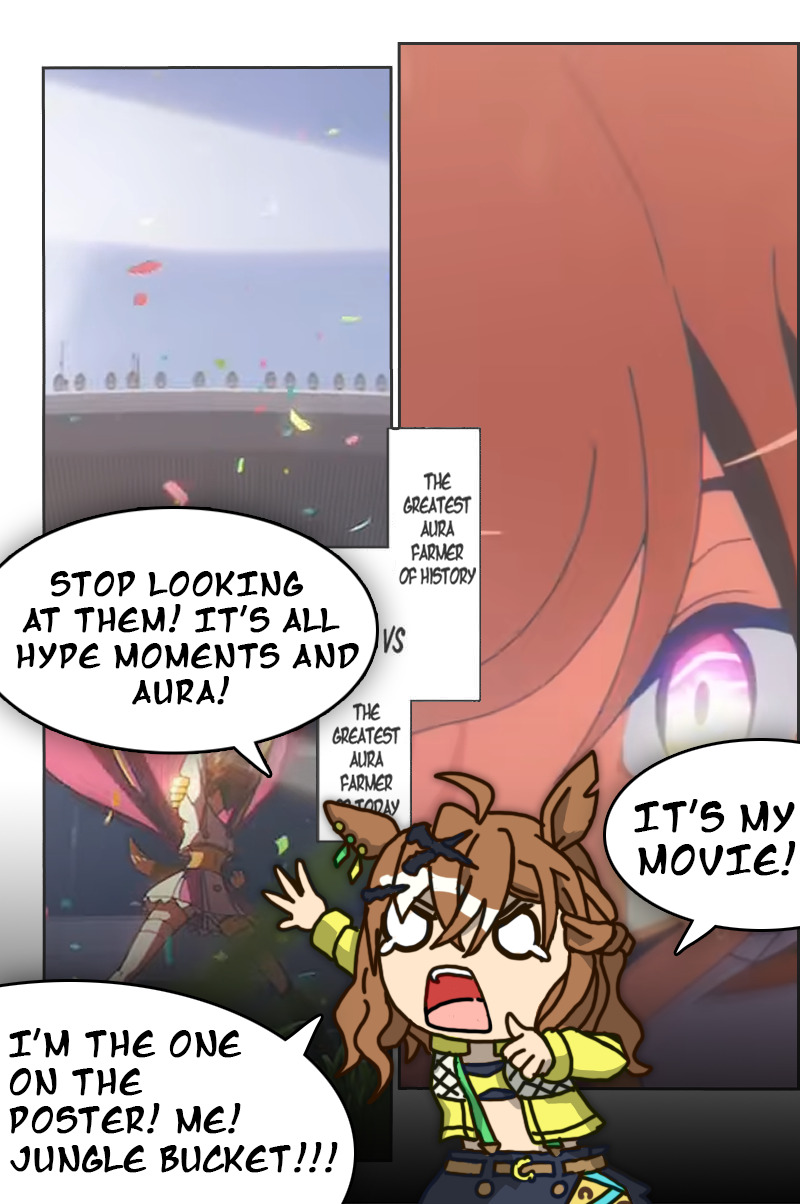
If there's one point of criticsm I can raise, it's that Jungle Pocket gets lost in her own narrative a bit, especially at the end. Her opps are way too interesting and charismatic, and that isn't her fault! If this were a 10-12 episode series instead of a feature film, it probably would have given her and Dantsu Flame more screen time and opportunities to shine. Still, I love it.
I wish this had been the first bit of Uma content I had ever seen. Compared to the first season of the show, this tightly encapsulates all the things that make the series great. I am leaving a lot of meat on the bone, there's more to the story than I am telling. I didn't even get into talking about the girl who sees ghosts, or the ways in which their personalities mesh and conflict. It's really good stuff. Go watch it.
Season 1
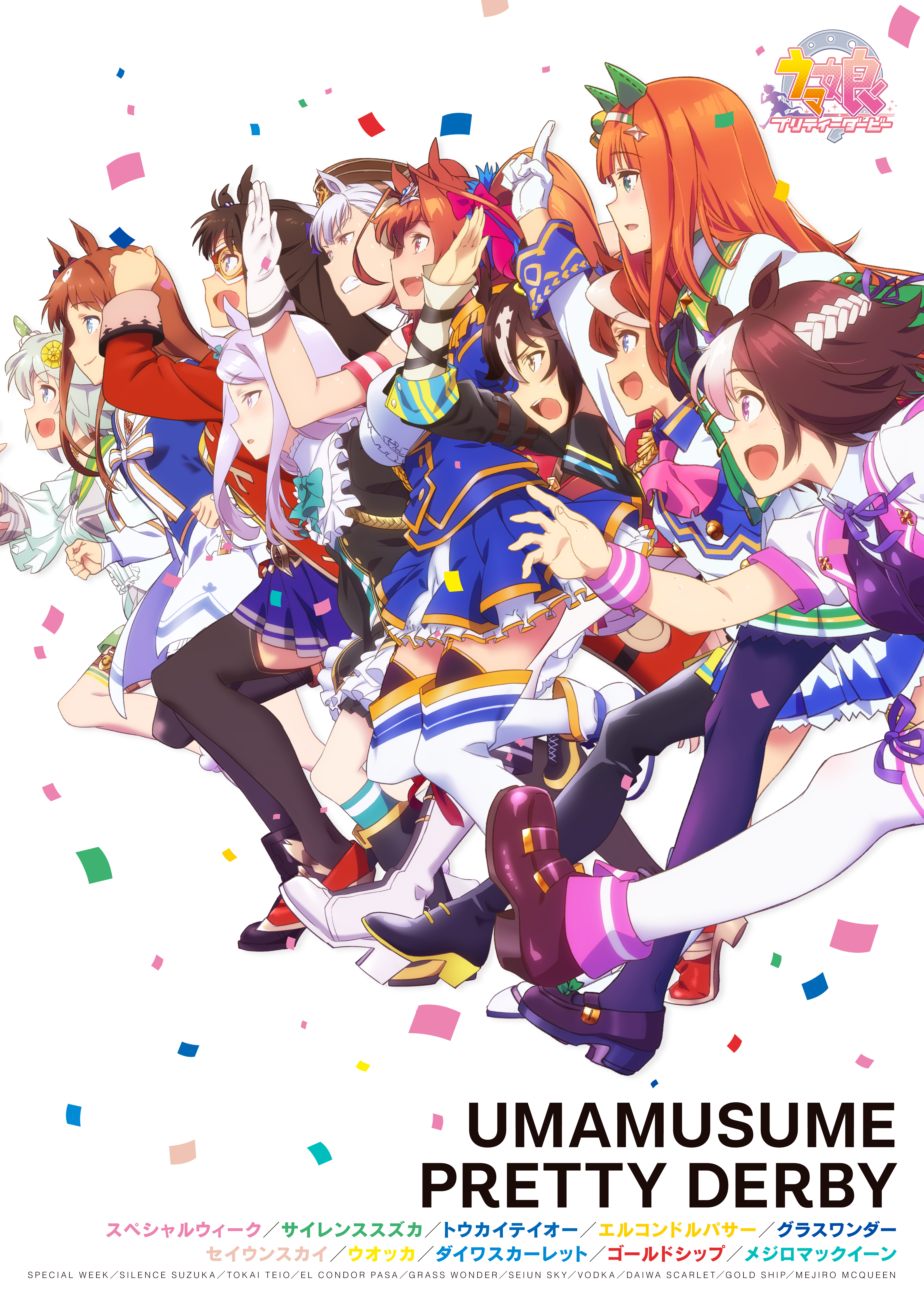
Season one took a while to pick up steam. The series opens following Special Week, the new girl at Tracen Academy. A fish out of water, she tries to find her way at the prestigious horse-girl school, with the ultimate goal to be the top horse-girl in all of Japan. She does not measure up when she tries out for the most stacked team in school, but finds a home on Team Spica, a group of rag-tag girls who help build each other up.
It is a bit of a slow burn coming out of the gate, but that is probably for the best. You really need to ease a general audience into the concept of the show, and the relationships between the umamusume, the teams and trainers, and the ebb and flow of the race season. Latter parts of season one, and the majority of season two, carry a sense of emotional weight that surpised me. After such a silly premise and setup, the gravitas with which these girls carry themselves through friendly rivalry, achieved and dashed dreams, injuries, and myriad other challenges, got a cry out of me shockingly frequently. I may simply be a soft touch, and I am also prone to being moved by sports stories, but I was really impressed with the way they executed on the premise.
Season 2
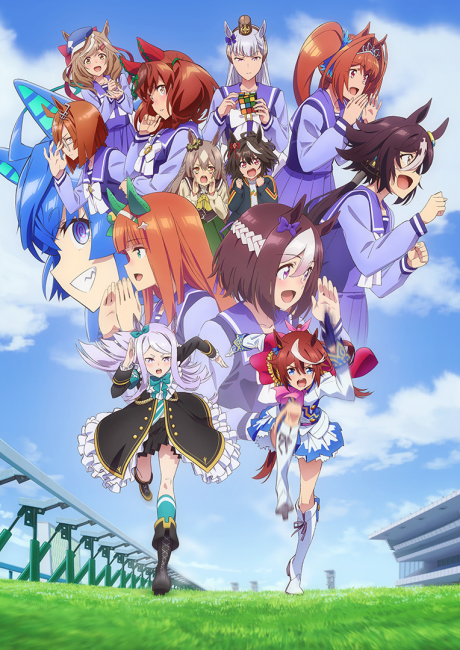
Season 2 was a bit of a rollercoaster. While two key characters fight against numerous setbacks and try to lift each other thorugh the challenges they're facing, the story rotates through key players on other teams, fleshing out the competitive atmosphere of race days. One especially fun story revolved around a girl who was desperate for adoration and fandom, and was mortified to discover that her victories led to derision for spoiling the result the crowd had hoped for. Through the collective effort of many of her classmates, including the one she beat in her previous race, she goes on to compete and give it her all, embracing the ups and downs that come with competition.
The A-plot of Season 2 was really well done. The narrative does a great job of illustrating the mountains both girls are moving to try and compete, and the physical, mental, and emotional toll that their situations put them through. The conclusion was cliche, but still pitch perfect as far as I am concerned. I got a lot of catharsis laughing and crying with these two, and I'll be returning to this season sometime soon.
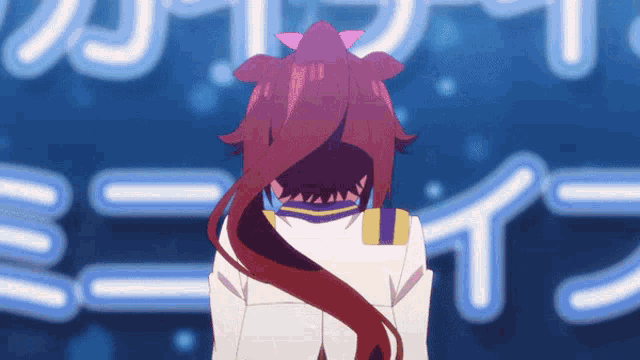
Altogether, I believe Umamusume is better than the sum of its parts, and better than it has any right to be. I came in with zero expectations, just hoping it would be silly and fun nonsense a la My Deer Friend Nokotan. I initially felt a tinge of cynicism seeing the gacha game that the series originated from, as someone who has some misgivings about how gambling mechanics and collectables separate many from their money. I was glad to (mostly) be proven wrong though, instead seeing a show with a simple story, a gonzo premise, and a ton of heart. The second season also hints at deeper feelings between the umas for the yuri enjoyers among you.
Your mileage may vary when it comes to the emotional beats and drama of competition. If you have ever been moved by a player retirement, a championship, an underdog or cinderella story, or anything else revolving around sports and emotions and where the two connect, you may find a surprisingly gripping show just under the outlandish veneer. If that part doesn't stick for you, but you just like cute girls doing cute things, you could certainly do worse.
Season 3
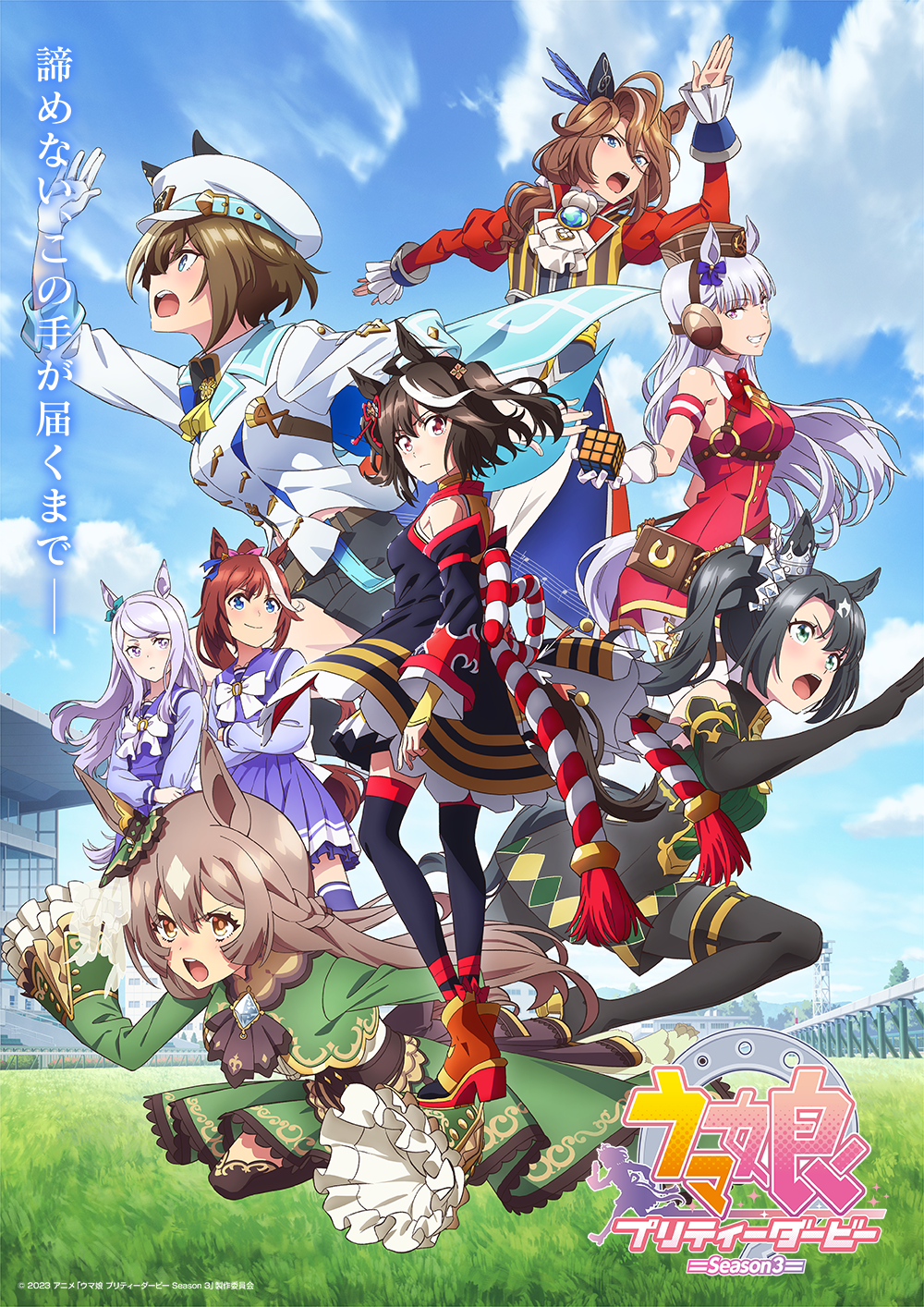
The third season picked up where the second left off, both narratively and figuratively. This season revolves around Kitasan Black and Satono Diamond,friends who attended the big races during season 2 as small children and were inspired to follow after their heroes from that story.
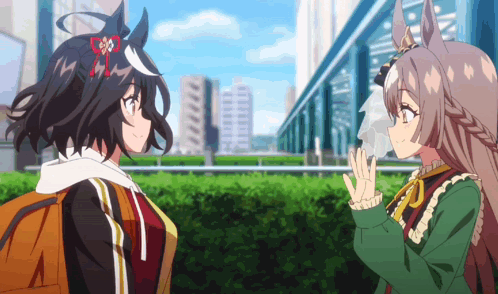
Kita admires Tokai Teio, the main character from the season prior, and leans on her mentorship as she takes her first steps into her racing career. When she runs into early challenges, she commits to intensive training, led by season 2 rival Mihono Bourbon. Through a mix of strength training, sprints, distance running through rough terrain, and mountain-climbing, Kita becomes the strongest version of herself and starts dominating in big races. Dia, meanwhile, is trying to overcome an apparent generational curse, where two generations of Satonos repeatedly fell short in top-tier competition. These shortcomings, often chalked up to bad luck, also extend into her early career. Watching Kita find success drives her to dig deep. She embraces her lifelong friend as a rival who must be conquered, and in dramatic fashion, wins and disspells the rumors of her family curse, spurring her younger siblings to chase their own dreams.

Afterwards, Kita and Dia's careers split into radically different paths. Dia tries to take her career internationally, heading to Europe to race the best in the world. She encourages Kita to join her, but Kita realizes during her training that she's starting to reach her physical limits and anticipates physiological decline. She decides to work her hardest for the final three races of her career, and repeatedly runs into the limits that her declining ability place onto her.
While she struggles mightily as she feels her body falling out of its peak, she finds new inspiration in the community support she recieves from her local fans. She is a mainstay in the neighborhood she passes on her way to the academy, helping shopkeepers and the like. Those folks show up to cheer her on through the tail end of her career, and she aims to pay back their support in her final race.
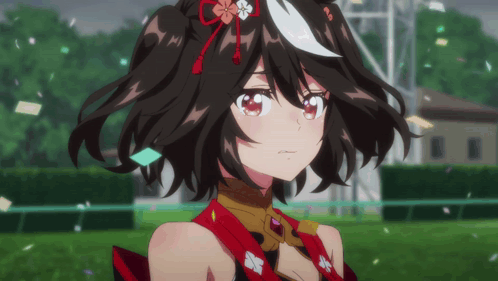
This season is a great continuation of the franchise's greatest strengths. The writing is tight and the character dynamics are charming. They clearly got a boost in their animation budget, and the tension of the races are captured well through it. I thoroughly enjoyed this season and look forward to returning to it in a year or two.
To Sum it Up
TL;DR: The anime's good! Watch it!
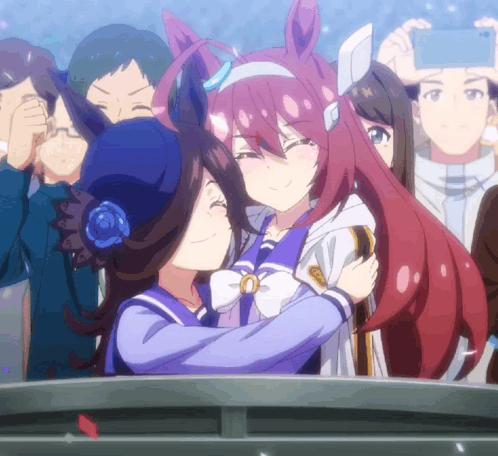
Previous: The Mobile Game | Next: Conclusion | Back to Start